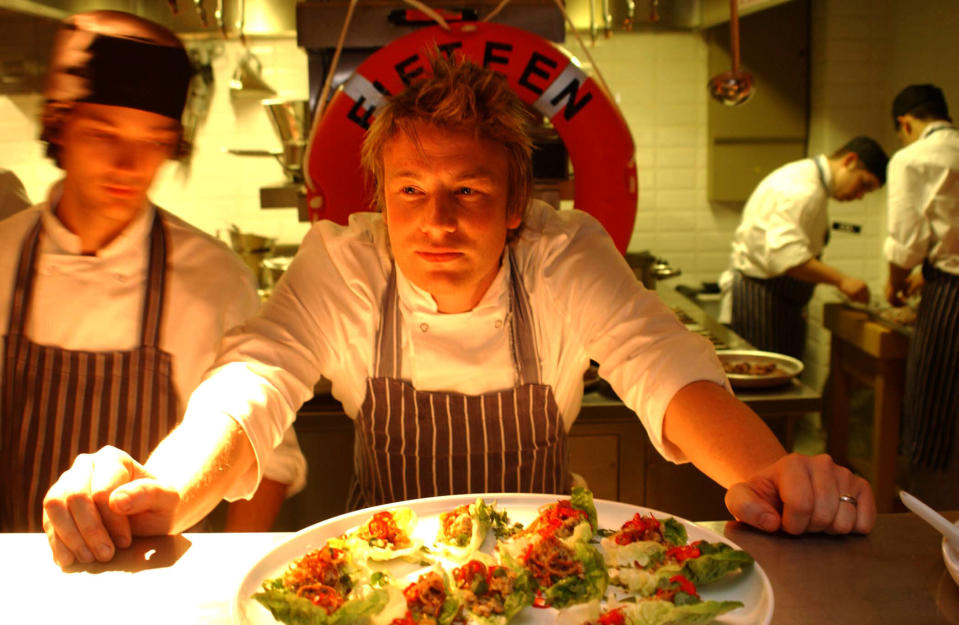Jamie Oliver restaurant empire collapses, with 1,000 jobs lost
Administrators appointed to Jamie Oliver’s restaurant empire have closed all but three of the company’s restaurants, in a move that will see around 1,000 employees lose their jobs.
The company, which includes 22 Jamie’s Italian restaurants in the UK as well as the celebrity chef’s Fifteen and Barbecoa restaurants, on Tuesday appointed accounting firm KPMG as administrator.
“Unfortunately, with insufficient funds available to be able to trade the business in administration, all but the Gatwick airport restaurants have now closed,” joint administrator Will Wright, a partner in KPMG, said in a statement.
In a tweet on Tuesday, Oliver said: “I’m devastated that our much-loved UK restaurants have gone into administration.”
“I am deeply saddened by this outcome and would like to thank all of the people who have put their hearts and souls into this business over the years.”
KPMG confirmed that around 1,000 employees would be made redundant, but said that all restaurant staff salaries would be paid up to the date of its appointment. The group employs around 1,300 staff across 25 restaurants.
Trouble has been brewing for Oliver’s empire for some time, and it has been seeking a new investor.

READ MORE: The full list of Jamie Oliver restaurants at risk of closing
Over the course of several months in 2017 and 2018, the chef was forced to inject almost £13m of his own money into the company to save it from bankruptcy.
Discussing that move, the celebrity chef said a “perfect storm” had brought his restaurant chain to the brink, blaming a combination of high rents, rates, food costs, a decline of the high street, Brexit, and the increase in the minimum wage.
Last year, the group sold five of its Australian restaurants in a last-minute rescue deal, while a sixth was forced to close.
I’m devastated that our much-loved UK restaurants have gone into administration. I am deeply saddened by this outcome and would like to thank all of the people who have put their hearts and souls into this business over the years. Jamie Oliver
— Jamie Oliver (@jamieoliver) May 21, 2019
Oliver closed six of his UK-based Jamie’s Italian branches in 2017, blaming the “pressures and unknowns” of Brexit, and sold a further 12 of them in January 2018.
In its most recent financial year, the company lost almost £20m. Sales fell by around 11%, to just £101m. It blamed the “ongoing challenges of the casual dining sector.”
“The current trading environment for companies across the casual dining sector is as tough as I’ve ever seen,” Wright said on Tuesday, adding that the company’s directors had worked “tirelessly to stabilise the business.”
In February 2018, court documents revealed that Jamie’s Italian, which was founded in 2008, had debts of more than £70m, including £30m in overdrafts and loans.
READ MORE: Jamie’s Italian latest in string of casual dining brands to suffer
At its peak, there were more than 40 Jamie’s Italian branches.
In a further statement on Tuesday, Oliver said the chain’s intention had been to positively disrupt mid-market dining in the UK “with great value and much higher quality ingredients, best-in-class animal welfare standards and an amazing team who shared my passion for great food and service.”
“And we did exactly that,” he said.
Oliver’s media business, including his roster of best-selling cookbooks and TV shows, is unaffected by the collapse of his restaurant empire. In its most recent financial year, profits at that firm jumped 45% to £8m.
Having sold more than 40 million books, Oliver is not only the UK’s most successful celebrity chef, but also the country’s best-selling non-fiction author.



